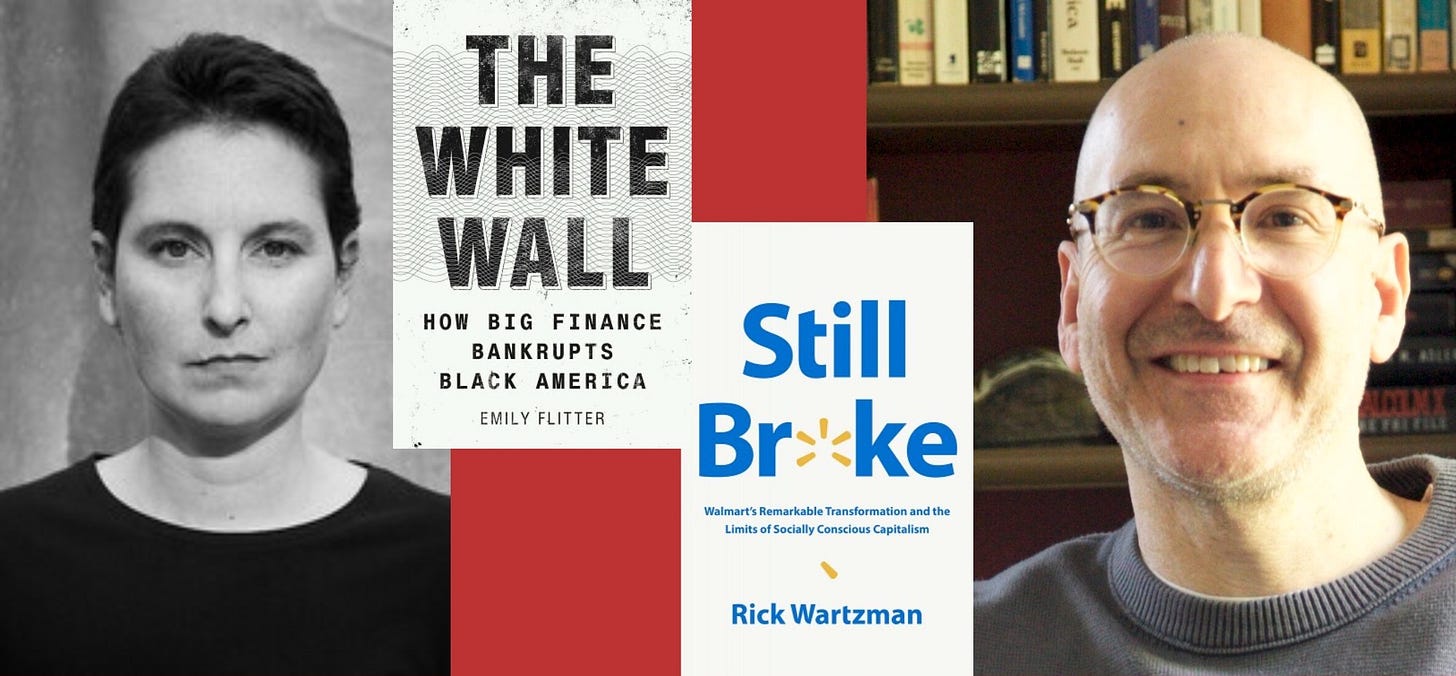The CEOs (Still) Aren’t Going to Save Us
Executives promise ‘stakeholder capitalism,’ but as two new books show, profits still come first.

This week I reviewed two timely new books for The Guardian. Here’s the link to the full review: “The savior CEO and the empty promise of ‘stakeholder capitalism’.”
The first book is The White Wall: How Big Finance Bankrupts Black America, by New York Times finance reporter Emily Flitter. As the review summarizes:
In a memo to JPMorgan employees a few weeks after the murder of George Floyd, [JPMorgan chairman and CEO Jamie] Dimon wrote, “Let us be clear—we are watching, listening and want every single one of you to know we are committed to fighting against racism and discrimination wherever and however it exists.” Yet as Flitter reveals with devastating clarity, from sidelining Black employees to offering Black customers inferior lending terms and investment products to promoting predatory practices in predominantly Black communities, such commitments are often little more than empty rhetoric. Empty rhetoric does nothing to address the racism that remains deeply entrenched in finance, but that doesn’t mean rhetoric is pointless—at least for executives.1
The second book is longtime business journalist Rick Wartzman’s Still Broke: Walmart’s Remarkable Transformation and the Limits of Socially Conscious Capitalism:
Still Broke traces Walmart’s history through the lens of the company’s employees. This unexpectedly engaging book portrays a company making progress, but of a very narrow sort: the type of progress that happens on executives’ terms, not workers’; the type of progress that is considered progress only because the starting point was so bad. It’s the type of progress, in other words, that aptly reflects most corporations’ social and environmental responsibility efforts.2
I anchor the review on the concept of “stakeholder capitalism,” which pledges that companies now serve employees, communities, the planet, and other “stakeholders,” not just themselves. The review centers on Jamie Dimon, the chairman and CEO of the global investment bank JPMorgan Chase, and Doug McMillon, the chairman and CEO of Walmart, who are two of the key characters in The White Wall and Still Broke, respectively.
While neither title is about stakeholder capitalism, both JPMorgan and Walmart—and particularly these two chief executives—have become increasingly fond of grandiose promises to fight racism, protect their employees, and otherwise solve society’s problems.
“It is tempting to cling to the belief that companies like Walmart can change the world, especially at a time when government is so polarized and dysfunctional,” Wartzman writes in Still Broke. But as Wartzman’s book and The White Wall make clear, there are limits (to put it mildly and perhaps too generously) to what even the most well-intentioned company or CEO can achieve.
You can read the full review here: “The savior CEO and the empty promise of ‘stakeholder capitalism’.” Thanks as always to The Guardian’s Dominic Rushe.
https://www.simonandschuster.com/books/The-White-Wall/Emily-Flitter/9781982183240
https://www.publicaffairsbooks.com/titles/rick-wartzman/still-broke/9781549156250

